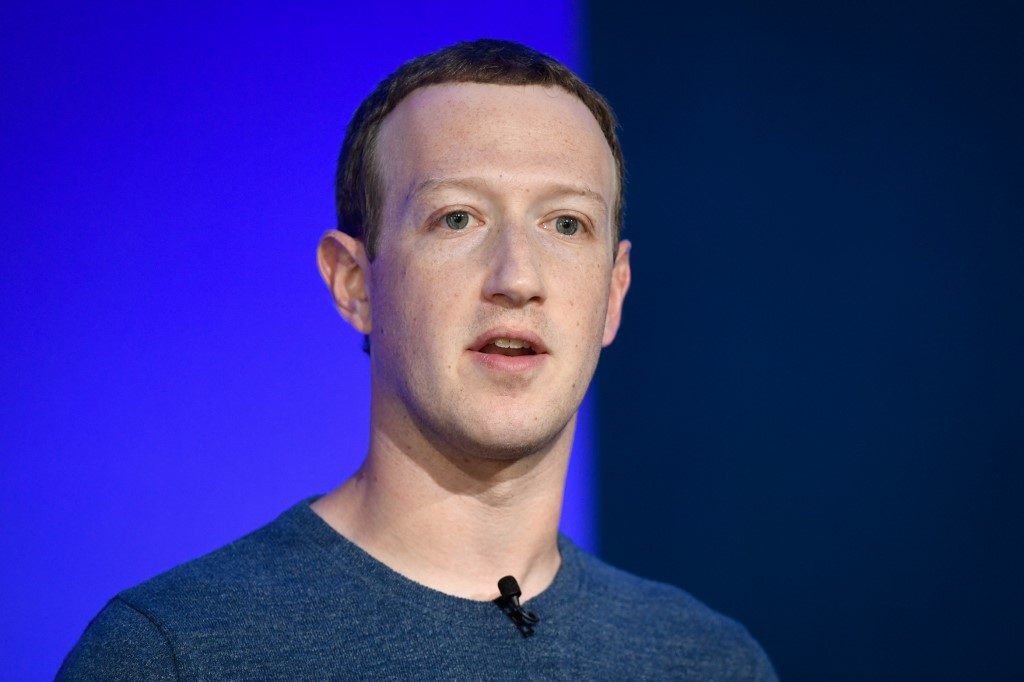SUMMARY
This is AI generated summarization, which may have errors. For context, always refer to the full article.

Mark Zuckerberg on Thursday, July 29, 12 noon EST (Thursday, July 30, 12 am Philippine time) will face the US Congress for the 4th time in the past two years to answer inquiries on Facebook being anti-competitive.
Zuckerberg will be joined by 3 other heads: Amazon’s Jeff Bezos, Apple’s Tim Cook, and Google-parent Alphabet’s Sundar Pichai. (READ: What to expect: U.S. Congress and big tech CEOs to face off in antitrust hearing)
The 4 have released their opening statements prior to the hearing, all of which, naturally, defend their respective companies against accusations of being too big and too powerful. (READ: Bezos to tell U.S. Congress: Amazon is in a ‘competitive’ global retail market)
In Zuckerberg’s statement, the CEO makes a case for their aggressive moves to conquer the market as actions that are necessary for survival. He paints the tech scene as something where you’re in one moment, and out the next.
“The history of technology is often the history of failure, and even industry leading tech companies fail if they don’t stay competitive. This is why we’re focused on delivering better services for people and businesses, and competing as vigorously as we can within the rules,” Zuckerberg said, hinting at their vulnerability despite being one half of the digital ad global duopoly along with Google.
Zuckerberg mentions having started from nothing, calling their current place in the ecosystem an American success story driven by competition.
When Snapchat became a threat a few years ago, Facebook-owned Instagram quickly introduced ephemeral “Stories” and filters, reducing the novelty of the then-nascent chat app. Facebook tried to copy TikTok with an app called “Lasso” but failed. Instagram itself was a Facebook acquisition back in 2012.
The platform, historically, has been very quick at adapting to potential new competitors. In his statement, Zuckerberg paints a picture of an ultra-competitive tech scene, that the platform has vulnerabilities, that there is real competition, and it isn’t powerful as it may appear.
“Facebook supports its mission of connecting people around the world by selling ads, and we face significant competition. We compete against the companies appearing at this hearing, plus many others that sell advertising and connect people. We also compete globally, including against companies that have access to markets that we aren’t in,” he said.
According to Statista, Facebook has 2.6 billion users worldwide as of July 2020. Following it are YouTube with 2 billion; Facebook-owned WhatsApp and Messenger with 2 billion and 1.3 billion, respectively; China’s WeChat with 1.2 billion; and then another Facebook-owned app, Instagram, with 1 billion.
By sheer user size, nothing really comes close to Facebook and its family of apps.
A few times in his statement, Zuckerberg seems to stress how essential Facebook has become to the American family.
“Every day, millions of Americans use our services to stay in touch with friends and family and talk about issues that matter to them. People use our apps to share videos, photos, livestreams, posts, and private messages; to join communities, set up fundraisers for good causes, and even register to give blood. These services create a lot of value in people’s lives, and our business model means we can offer them for free,” he said.
In order to offer targeted ads that advertisers desire, Facebook’s business model makes usable data out of the information and posts that users create. It has relied on constant user engagement and content virality that can lead to the spread of sensational, non-factual content.
Zuckerberg, in his statement, emphasizes that they are an American company, built with American values, built for the American family, and mentions China as a growing force.
“Although people around the world use our products, Facebook is a proudly American company. We believe in values – democracy, competition, inclusion, and free expression – that the American economy was built on. Many other tech companies share these values, but there’s no guarantee our values will win out,” Zuckerberg said.
“For example, China is building its own version of the internet focused on very different ideas, and they are exporting their vision to other countries. As Congress and other stakeholders consider how antitrust laws support competition in the U.S., I believe it’s important to maintain the core values of openness and fairness that have made America’s digital economy a force for empowerment and opportunity here and around the world,” he continued.
Zuckerberg also calls for government regulation while reiterating his familiar stance of not being the sole arbiter for certain critical issues.
“I understand that people have concerns about the size and perceived power that tech companies have. Ultimately, I believe companies shouldn’t be making so many judgments about important issues like harmful content, privacy, and election integrity on their own. That’s why I’ve called for a more active role for governments and regulators and updated rules for the internet,” the Facebook CEO said.
He ends his statement with a quick anecdote that, again, wants to explain why they have to be very aggressive in this industry: “Several years ago, Facebook moved our headquarters to the campus where Sun Microsystems used to be. We kept their sign out front, on the back of ours, to remind us that things change fast in tech. I’ve long believed that the nature of our industry is that someday a product will replace Facebook. I want us to be the ones that build it, because if we don’t, someone else will. Thank you, and I look forward to your questions.” – Rappler.com
Add a comment
How does this make you feel?
There are no comments yet. Add your comment to start the conversation.